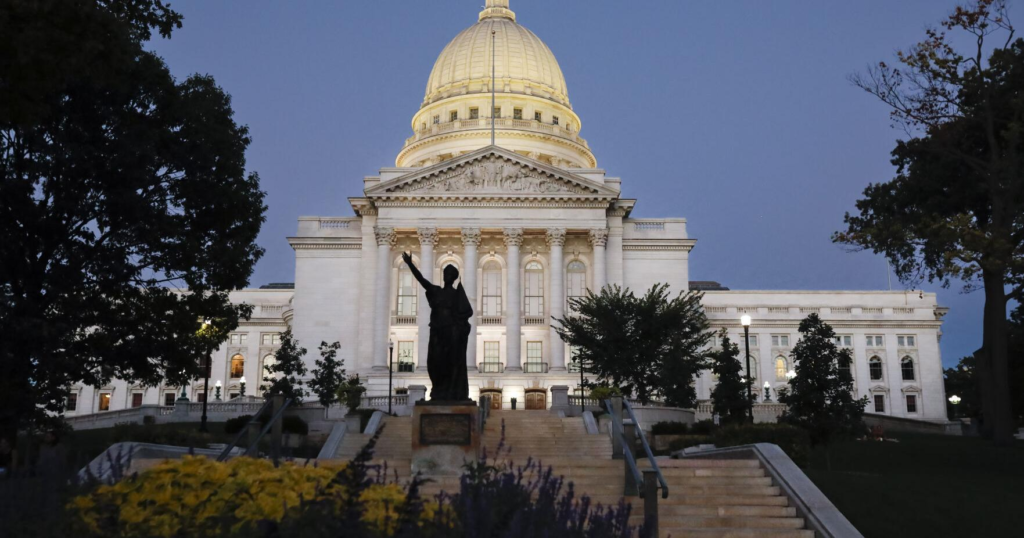Republican leaders of the Wisconsin Legislature’s powerful budget committee did not invite the state education leader for a budget briefing as they have in the past.
K-12 education reporter
K-12 education reporter
Republican leaders of the Wisconsin Legislature’s powerful budget committee did not invite the state education leader for a budget briefing as they have in the past.
Despite a proposed $2.6 billion increase to the K-12 education budget for the 2023-25 biennium, Republican leaders of the state’s powerful budget committee did not ask for the state’s education department to offer rationale at recent budget hearings.
The Department of Public Instruction has been part of the biennial budget briefings in each budget cycle at least as far back as the 2003-05 budget, according to Tom McCarthy, executive director of the office of the state superintendent.
State Superintendent Jill Underly said in a press conference Monday that she was “surprised and also hurt” not to receive the invitation, which went only to four departments: corrections, transportation, administration and safety and professional services.
“Public education has been in the news and been such a huge priority among everybody I’ve spoken to,” Underly said. “The budget is so important when you think about all the needs that are in our schools, in our communities and among our kids.”
JFC co-chair Rep. Mark Born, R-Beaver Dam, said in a statement provided to the Cap Times that, “Students in our state are being failed by the Evers Administration, as demonstrated by slipping test scores.”
“The Joint Committee on Finance does not need to bring in Dr. Underly to hear more empty promises about how DPI wants to better serve our kids,” Born said. “Republicans are gathering feedback from families and local school district officials across the state and will craft a budget that supports our kids and gives teachers and schools the tools they need to improve our students’ educational outcomes.”
The office of JFC co-chair Sen. Howard Marklein, R-Spring Green, did not respond to a request for comment Monday on the decision.
Republican leaders reacted to Evers’ budget request in February by suggesting it was a non-starter, and legislators would instead mostly write their own base budget to start from. While school districts put together their budgets for the 2023-24 school year, they are awaiting information from the state on how much they’ll be able to spend and how much aid they’ll receive.
Under the proposal from Evers and Underly, districts would see increased revenue limits, boosted funding for special education and mental health initiatives and free school breakfasts and lunches for all students.
On Monday, Underly said she has spoken to individual representatives and senators, but not the JFC as a whole about the budget. She suggested there will be wide-ranging “repercussions” if legislators fail to provide enough funding, especially after two years of no increase in the per-pupil revenue limit, which governs how much districts can receive through the combination of state aid and local property taxes.
“Joint Finance has had opportunities to provide our students with resources that they’ve needed for success, even in years without this incredible surplus boon,” Underly said. “There are no excuses, they need to do their job.”
In the prepared remarks Underly would have delivered with an invitation, she used two example Wisconsin districts to illustrate the common and distinct challenges districts face.
“The fact is that the School District of Jefferson is not unique in its challenges, but its challenges may have uniquely local solutions,” the remarks state. “That is why our schools need an increase in general funding, enabling each district to respond to its specific challenges in the way that best addresses them.”
Evers’ proposal includes a significant increase in revenue limits for school districts.
Effectively, it’s a spending cap, and any increase in state aid without a corresponding increase in the revenue limit serves as a property tax cut. The concept of a revenue limit, determined by a level of spending per student set in the state budget, first came to Wisconsin in the 1993-95 budget to combat what critics considered soaring property taxes.
The proposal includes a per pupil revenue limit increase of $350 next fiscal year, which begins July 1, and an additional per pupil bump of $650 in the second year of the biennium. The governor’s office said the increases would represent the largest per pupil adjustments since revenue limits were adopted.
Evers also proposed spending $120 million in the second year of the two-year budget to fund school breakfasts and lunches for all students, which would have Wisconsin join states like California and Maine that have implemented similar proposals using budget surpluses.
Universal free meals were a feature of the pandemic nationwide, as districts received extra funding to provide the service. Participation in school meal programs went up, and supporters said removing barriers to apply for free and reduced meals meant more students in need were able to eat, making them better able to learn.
Once that funding stream stopped, however, most districts returned to the old system, which requires a family to sign up for free and reduced-price meals.
Other major initiatives include a more than $270 million investment in mental health programs and more than $1 billion toward reimbursing districts for special education service costs.
Scott Girard joined the Cap Times in 2019 and covers K-12 education. A Madison native, he graduated from La Follette High School after attending Sennett Middle School and Elvehjem Elementary School during his own K-12 career.
Support Scott’s work and local journalism by becoming a Cap Times member.
To comment on this story, submit a letter to the editor.
Become a Cap Times member today and enjoy great benefits.
Get up-to-the-minute news sent straight to your device.

